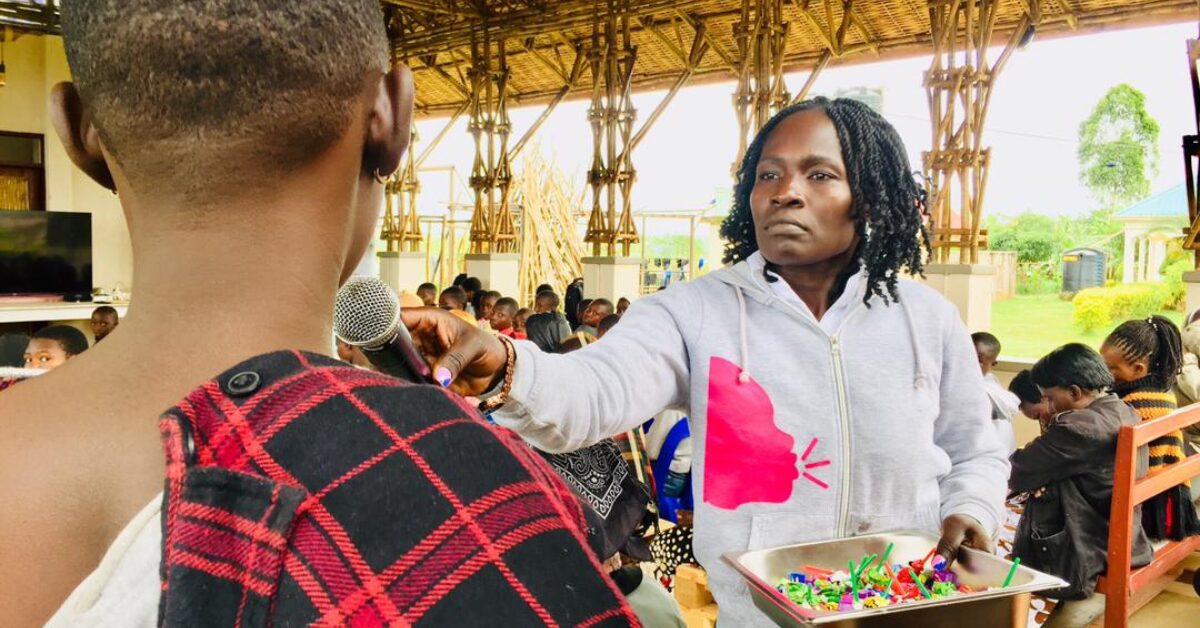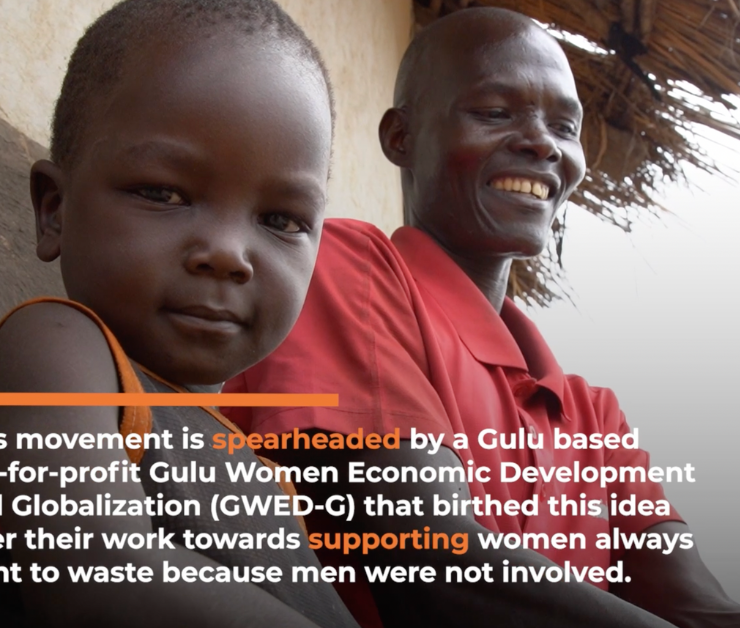“Anonymous and online”: The platform providing mental health support to victims of sexual violence in Uganda
- Limited resources in Uganda means victims of sexual violence cannot access necessary psychosocial support, Totya Platform is stepping up to fill that gap.

Editors note: This story contains references to sexual violence.
Kampala, Uganda (Minority Africa) — Faith*, a salesperson living in Kampala was introduced to Eddie by a friend to make stickers for his business. After staying in touch for over a year, Eddie called her with a business proposal.
“He called me saying he had a friend with a big salon in Zana who would buy my products at wholesale price,” Faith explains. “But I told him we weren’t ready for that because we didn’t have the capacity to produce in large quantities. So, I decided to put him on hold.”
Eventually, in July 2023, Faith informed Eddie that she was ready to sell the products and the duo agreed to meet. The meeting point was decided to be his house. While there, Eddie then asked Faith for sex, offering her any amount of money if she complied.
“I denied his requests. He got angry and told me I would have sex with him whether I wanted to or not. When I stood up to leave, I noticed he had locked the door,” she says.
“I kept fighting. I told him I was on my period, hoping it would deter him, but he didn’t care. I was scared of getting infected with HIV and becoming pregnant, so I asked him to at least wear a condom, which he did. But I felt betrayed and hurt.”
Faith wanted to share her experience with a friend as well as find justice but at the same time, she feared judgment.
“That’s when I remembered sharing a room with someone from Totya Platform,” she tells Minority Africa. “I called her and asked to meet her since I feared all men at the time. I went to her home and explained everything. She listened without judgment and called [a counsellor] who arrived early in the morning. I told her my story too.”
Within minutes, Totya Platform’s car arrived to take Faith to Kampala. “We went to the police and opened a case. Then we went to a medical facility for tests. When the culprit was arrested, everyone judged me, calling me a prostitute, which was all lies.”
Founded in 2019, Totya Platform is an anonymous online platform that supports victims of sexual violence with access to free psychosocial and legal support services via SMS, social media and a toll-free hotline.
Research conducted by Advocates for Human Rights revealed that survivors of sexual violence often face significant challenges in terms of their mental and emotional well-being. The impact of sexual violence on mental health can be profound and varied, including symptoms of post-traumatic stress disorder (PTSD), depression, anxiety, and other mental health disorders.
Uganda, like many other low-income countries, has limited resources and support services for survivors of sexual violence. According to a 2022 report by the Uganda Police Force, a total of 8,960 cases of defilement and 1,623 cases of rape were reported to Police compared to the 10,653 cases of defilement and 1,486 cases of rape reported in 2021. A 15.9 per cent decrease in defilement and a 9.2 per cent increase in rape cases registered in the country.
This lack of resources can make it difficult for survivors to access mental health counselling and support, which are crucial for their recovery. It formed part of what inspired Janet Aguti in 2019 to start Totya Platform.
“When we started, we realized there were people who needed more than just online counselling,” she says. “There were those who needed emergency medical care and examinations, people who needed their cases to be taken to the police, but because they didn’t have the resources needed, we decided also to go and venture into supporting them in those aspects.”
Aguti had suffered sexual violence from a close member of her family when she was eight years old. Being abused at such a young age and not having the courage to speak up affected her in all aspects of life.
“My moods would switch at any time,” she says. “It affected my social life and my educational life as well because I lacked a lot of self-confidence to the point where while in the university, I failed to present my research paper, which caused me to fail.”
Aguti says finding an anonymous person she could open up to helped her get the help she needed, something she had not been able to do because of how society treats abuse victims.
“The help I got was anonymous and online; the person was based in the US, and I was here in Uganda,” she says. “Luckily enough, this person wasn’t mean like I expected because society can be harsh to a girl who has been sexually abused. You feel the victim blaming and all the things associated with that.”
Susan Ejang, the Emergency and Psychosocial Support Officer at Totya Platform says that to create trust with the survivors, they must believe whatever is told.
“We believe what they tell us has happened, and we listen, respect their boundaries, and try to be so patient with them and trust the process,” Ejang says. “We assure our survivors [of] confidentiality that anything that is told to us will be kept with the counsellor unless there is a need for a referral or some other actions with which we seek their permission and if they are below the age of 18 we talk to any of their guardians.”
Faith also appreciates Ejang’s promise of confidentiality. “She promised to keep everything a secret, and she kept her promise. I have never heard from anyone that my information is out. I was very happy about that.”
Providing counselling services can be draining mentally, but at Totya Platform, Ejang says, their staff also go through counselling sessions and training to prevent burnout. She adds that self-care is important to them, so they establish boundaries between work and personal time as their job is 24/7.
According to Aguti, Totya Platform has been able to carry out over 5000 online counselling sessions, with 349 survivors supported to access justice and 561 victims have received emergency medical support.
The platform also stands on a pillar of prevention, healing, and justice by engaging the families or the ecosystem of survivors and those at risk of abuse.
“So in the prevention aspect, we go into the communities and sensitise them about the dangers of sexual violence. We further discuss the different forms of sexual violence that culturally would be acceptable and people are not aware of,” Aguti tells Minority Africa.
“Sexual violence does not only affect one person; if a child or anybody has been abused in the family, the family is going to suffer the effects. We have a program we call home monitoring visits. We get to engage with the family of the person so that they know how to handle the situation themselves. And they also get psychological support in areas where they’re facing challenges.”
The healing process was challenging for Faith. “I had nightmares every time I had my period. I dreamt about the rape and isolated myself from people,” Faith says. “Counsellor Susan was there for me. She kept in touch and cared for me more than I had experienced even from my mother. I felt powerful because I knew I had someone fighting for me.”
For Ejang, witnessing the growth of a sexual violence victim is what fulfils her most about her job. “When I see someone who came when they were broken, and after some months, I see them with their head held up after all they have been through…[it] is fulfilling”
For Faith, the process is just as valuable as the destination.
“Totya Platform has supported me to gain my confidence because I am now a strong woman, I am growing. I’m even doing different ideas in my business,” she says. “They taught me how I can defend myself. I am glad that I can freely and openly talk about my experience because I was helped, and my healing process has reached somewhere.”
Edited/Reviewed by Caleb Okereke, PK Cross, Samuel Banjoko, and Uzoma Ihejirika.






